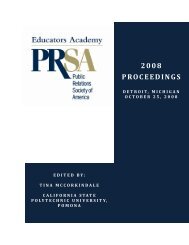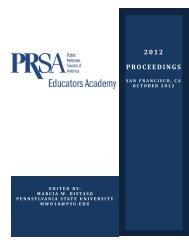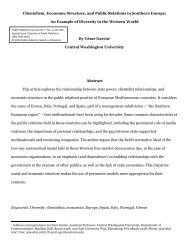2010 - Public Relations Society of America
2010 - Public Relations Society of America
2010 - Public Relations Society of America
You also want an ePaper? Increase the reach of your titles
YUMPU automatically turns print PDFs into web optimized ePapers that Google loves.
Uses and gratifications theory has provided a well-grounded perspective for studying<br />
motivations <strong>of</strong> blog readers (Kaye, 2005; Nardi, Schiano, Gumbrecht, & Swartz, 2004;<br />
Papacharissi, 2004; Trammell, Tarkowski, H<strong>of</strong>mokl, & Sapp, 2006). Kaye (2005), for example,<br />
identifies as motivations for blog use as: entertainment, communicating with friends who have<br />
blogs, knowledge seeking and serving as an information maven.<br />
This study elected to focus on three possible explanations for reading product blogs.<br />
Knowledge seeking involves users looking to blogs for specific information that might facilitate a<br />
purchase decision, reduce risk (Schiffman & Kanuk, cited in Henning-Thurau & Walsh, 2004),<br />
and/or provide information that is more up to date than information available in traditional media<br />
(Hamilton, 2003; Hastings, 2003; Kaye, 2005; Levy, 2002b; Ryan, 2003). Social utility refers to<br />
the idea that blog readers seek some sort <strong>of</strong> social advantage from the information obtained,<br />
based on the desire to be influential, to be affiliated with others, or to help others, to be socially<br />
accepted or to be recognized as an expert. This idea is consistent with the argument that<br />
maintaining personal relationships are primary factors why people want to use media (McQuail,<br />
Blumler & Brown, 1972). Diversion and entertainment refers to reading a blog simply for fun,<br />
relaxation, and enjoyment. Like other forms <strong>of</strong> Internet communication, such as e-mail or<br />
surfing the Web, reading blogs <strong>of</strong>fers an escape from boredom and work (Kaye, 2007).<br />
Affiliation/Independence <strong>of</strong> the Blogger<br />
The effectiveness <strong>of</strong> product messages in blogs were posited to be moderated by readers’<br />
perceptions about whether the blog author was a paid agent or employee <strong>of</strong> a product producer<br />
who received payments, gifts (including valuable product samples or freebies), or a salary from a<br />
marketer. These non-independent bloggers can be differentiated from independent bloggers,<br />
who are unaffiliated with product producers in any way and thus have nothing to gain or lose<br />
from making either positive or negative comments.<br />
Independence is an important dimension <strong>of</strong> source credibility, which has been shown in<br />
more than six decades <strong>of</strong> research to bias processing <strong>of</strong> persuasive messages. The greater the<br />
perceived source independence and credibility, the more likely the information will be accepted<br />
as accurate, believable, reliable and trustworthy (Hovland &Weiss, 1951; Ibelema & Powell,<br />
2001; Fogg & Tseng, 1999; Stanford, Tauber, Fogg & Marable, 2002). Similarly, greater source<br />
independence creates greater positive attitude change and behavioral intention (Hass, 1981;<br />
Milburn, 1991).<br />
Assessments about the credibility <strong>of</strong> blogs and bloggers vary widely, from general<br />
negative perceptions (Princeton Survey Research Associates International, 2005) to quite<br />
positive assessments among actual blog users (Banning, Bradley & Trammell, 2006; Johnson &<br />
Kaye, 2004). Research suggests that consumers look at a variety <strong>of</strong> cues when determining the<br />
quality <strong>of</strong> the online information, including disclosures about how information was obtained<br />
(Greer, 2003; Hong Nana, 2009; Lee & Youn, 2009).<br />
Positive v. Balanced Language Valence<br />
Finally, this study examined the consequences <strong>of</strong> language use, particularly in the<br />
inclusion <strong>of</strong> only positive comments about products (such as might be expected from a<br />
nonindependent blogger) versus more varied language where a combination <strong>of</strong> positive, neutral<br />
and negative comments might be included (such as might be expected from an independent<br />
blogger).<br />
Language expectancy theory (LET) assumes that people have specific expectations about<br />
the language and message strategies used by mass media and in other persuasive contexts<br />
(Burgoon, 1995; Burgoon et al., 2002). When words or the valence <strong>of</strong> ideas fall outside the<br />
79
















